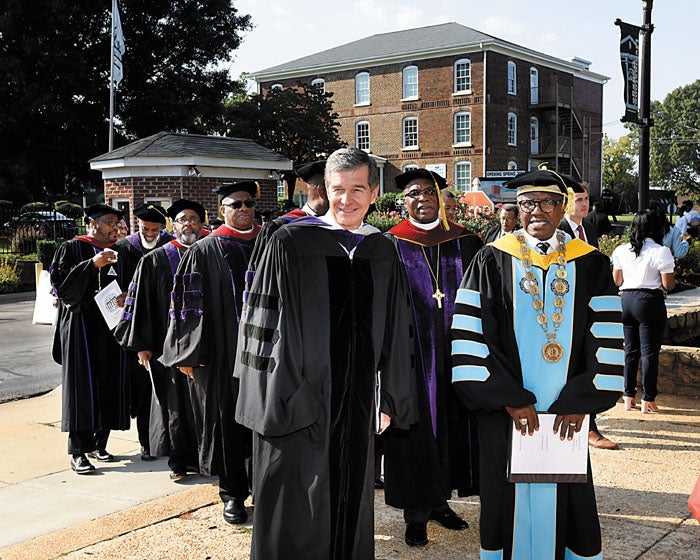Colin Campbell: How did Roy Cooper do in 2017?
Published 8:09 pm Monday, January 1, 2018

- In the center: N.C. Governor Roy Cooper and Dr. Jimmy R. Jenkins Jr. at Livingstone College. Photo by Wayne Hinshaw, for the Salisbury Post
RALEIGH — Gov. Roy Cooper has finished his first year in office — a year full of the fireworks that are common in a divided state government. Cooper and Republican legislative leaders have sparred on TV, in courtrooms and in the most thrilling arena of all: The Strongly Worded Press Release.
So how well did the governor do in 2017? Let’s start with the disclaimer — it would have been physically impossible for Cooper to accomplish everything he wanted.
Republicans have a veto-proof majority in both the House and Senate, and they’re not exactly eager to implement Cooper’s policy priorities. The governor has vetoed 13 bills so far, and he only managed to stop two of them while the rest were overridden or enacted in another way. The vast majority of Cooper’s budget proposals ended up in Senate leader Phil Berger’s trash can.
Instead, Cooper has been fighting to keep some of the basic powers that his predecessor, Republican Pat McCrory, enjoyed for the previous four years. He’s filed lawsuits challenging the legislature’s efforts to weaken his appointment powers and subject his Cabinet appointments to Senate confirmation. Those lawsuits are awaiting a verdict from the N.C. Supreme Court, and Cooper is optimistic about winning.
Cooper’s biggest legislative success of 2017 came in March when he helped negotiate a compromise on House Bill 2, the infamous LGBT “bathroom” law that cost North Carolina jobs, concerts and sporting events.
Working with a group of business leaders that included the heads of Blue Cross Blue Shield and the Charlotte Hornets, Cooper and legislative leaders came to the bargaining table and worked out a deal that no one was 100 percent happy with — but got just enough votes to pass the House and Senate.
It wasn’t a complete victory for the governor, who angered his supporters by agreeing to a compromise that bans local ordinances regulating public accommodations or private employment practices until Dec. 1, 2020.
But Cooper clearly believes in the old Otto von Bismarck quote “politics is the art of the possible.” There was simply no way he could get the GOP to support a full repeal, and the compromise was enough to persuade the NBA, NCAA and others to end their boycotts of North Carolina. Outcry from LGBT groups and others has calmed down since March, and the issue doesn’t get discussed as much now.
After the compromise, Credit Suisse announced plans to add 1,200 new jobs in the state. The financial services company had said HB2 staying on the books would have been a deal breaker.
The Credit Suisse expansion was one of many jobs announcements made by Cooper’s administration in 2017, and the governor ranks job growth as a top accomplishment. “We announced more than 21,000 new jobs this year, the most recruited by the state in any one year since 2006,” Cooper wrote in his year-end post on the website Medium.
Those stats show Cooper’s Department of Commerce leaders have been efficient in making incentive deals, but the same incentive programs were used by McCrory and previous governors. Republicans argue that Cooper is taking credit for companies attracted to North Carolina by their recent tax cuts — cuts that the governor wants to cancel.
Going into 2018, Cooper’s biggest challenge will come in effectively using the bully pulpit that comes with being governor. He’s been heavily stage-managed so far by a staff of public relations experts, so he rarely says anything unexpected and doesn’t do many media interviews.
We reporters often send questions to the governor’s office and get a bland canned statement from a spokesperson dodging the question. Cooper’s public speeches can sometimes be dull affairs that don’t generate headlines.
To accomplish his biggest goal for 2018 — electing enough Democrats to break the GOP’s veto-proof majority — Cooper will have to step up his rhetorical game. Without a major statewide candidate at the top of the ballot, Cooper will be leading the charge for his party’s candidates, and to succeed, he’ll need to stay in the headlines and energize voters.
Colin Campbell is editor of the Insider State Government News Service.

